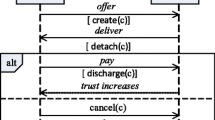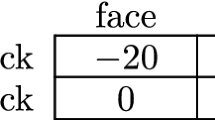Abstract
The paper presents a variation of the EMAIL Game, originally proposed byRubinstein (American Economic Review, 1989), in which coordination ofthe more rewarding-risky joint course of actions is shown to obtain, evenwhen the relevant game is, at most, ``mutual knowledge.'' In the exampleproposed, a mediator is introduced in such a way that two individualsare symmetrically informed, rather than asymmetrically as in Rubinstein,about the game chosen by nature. As long as the message failure probabilityis sufficiently low, with the upper bound being a function of the gamepayoffs, conditional beliefs in the opponent's actions can allow playersto choose a more rewarding-risky action. The result suggests that, forefficient coordination to obtain, the length of interactive knowledge onthe game, possibly up to ``almost common knowledge,'' does not seem to bea major conceptual issue and that emphasis should be focused instead onthe communication protocol and an appropriate relationship between thereliability of communication channels and the payoffs at stake.
Similar content being viewed by others
References
Binmore, K. and Samuelson, L., 2001, “Coordinated action in the electronic mail game,” Games and Economic Behavior 35, 6–30.
Dimitri, N., 2000, “Efficiency and equilibrium in the electronic mail game; The general case,” Quaderni del Dipartimento di Economia Politica 295
Gray, J., 1978, “Notes on database operating systems,” in Operating Systems: An Advanced Course, R. Bayer, R. Graham, and G. Seegmuller, eds, Lecture Notes in Computer Science, Vol. 66, Berlin: Springer-Verlag.
Halpern, J., 1986, “Reasoning about knowledge: An overview,” pp. 1–18 in Reasoning about Knowledge, J. Halpern, ed., San Mateo, CA: Morgan Kaufmann.
Halpern, J. and Moses, Y., 1990, “Knowledge and common knowledge in a distributed environment,” Journal of the ACM 37, 549–587.
Morris, S., 2001a, “Faulty communication: Some variations on the electronic mail game,” Advances in Theoretical Economics 1(1), Article 5.
Morris, S., 2001b, Coordination, Communication and Common Knowledge: A Retrospective on the Electronic Mail Game, Cowles Foundation, Yale University.
Morris, S. and Shin, H.S., 1997, “Approximate common knowledge and coordination: Some lessons from game theory,” Journal of Logic, Language and Information 6, 171–190.
Osborne, M. and Rubinstein, A., 1994, A Course in Game Theory, Cambridge, MA: The MIT Press.
Rubinstein, A., 1989, “The electronic mail game: Strategic behavior under ‘almost common knowledge’,” American Economic Review 79, 385–391.
Author information
Authors and Affiliations
Rights and permissions
About this article
Cite this article
Dimitri, N. Coordination in an Email Game without ``Almost Common Knowledge''. Journal of Logic, Language and Information 12, 1–11 (2003). https://doi.org/10.1023/A:1021180407318
Issue Date:
DOI: https://doi.org/10.1023/A:1021180407318




